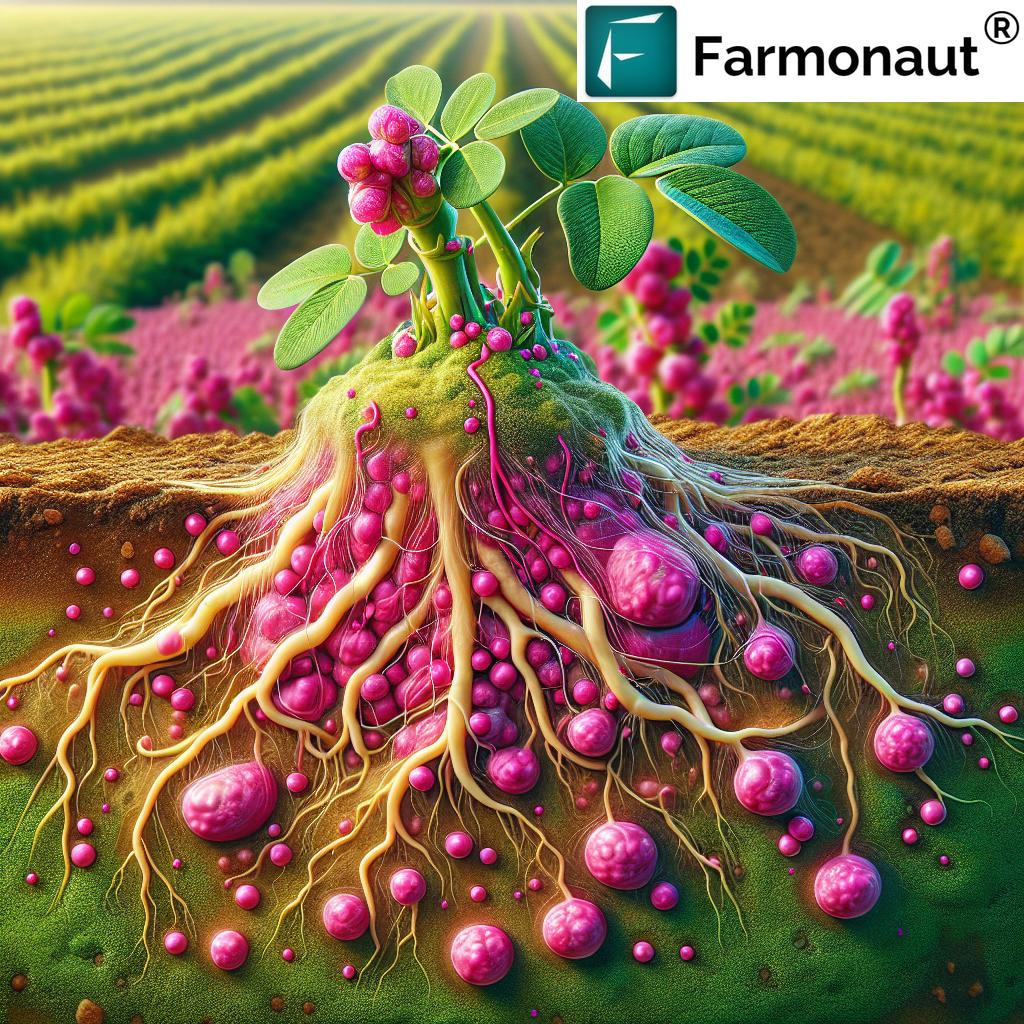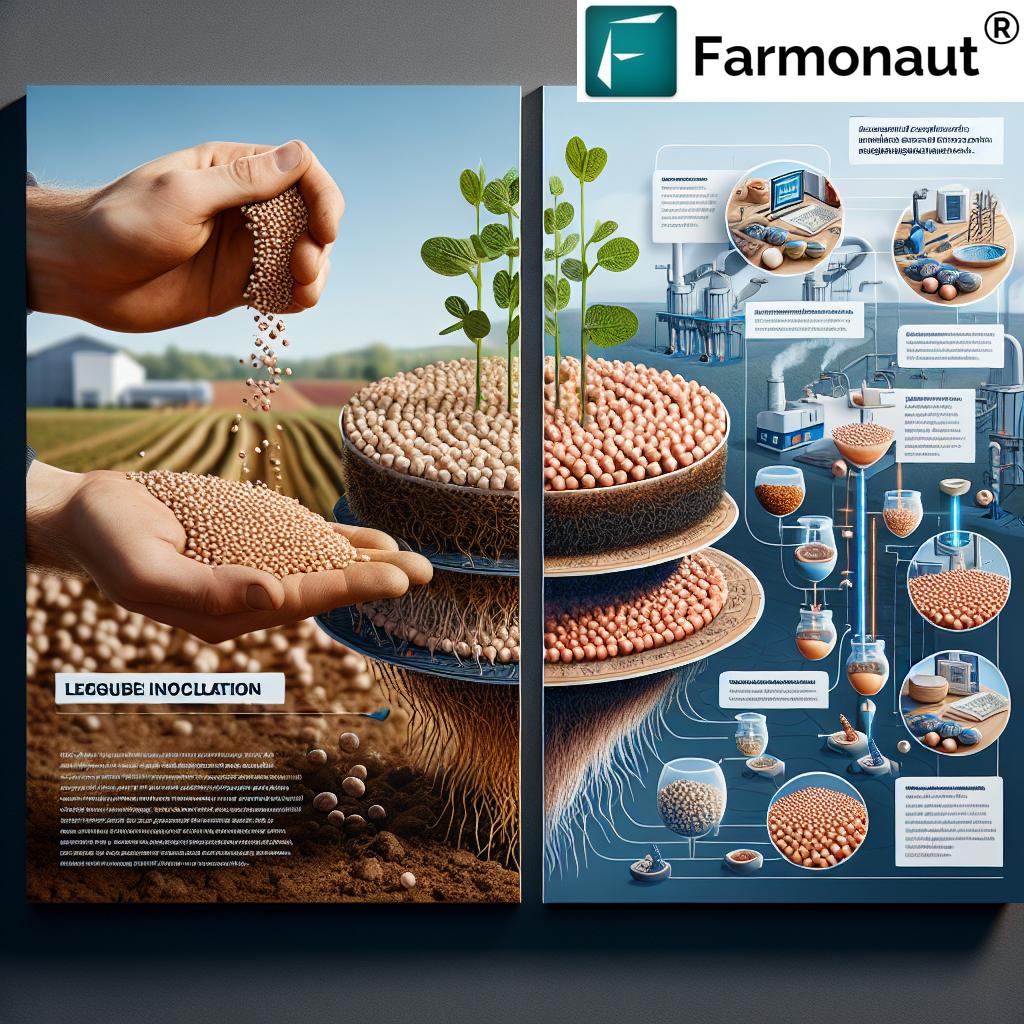Revolutionizing Chickpea Farming in Queensland: How Legume Inoculation Boosts Nitrogen Fixation and Crop Yields
“Proper legume inoculation can boost chickpea yields in Queensland to 2-3 tonnes per hectare.”
Welcome to Farmonaut’s in-depth exploration of innovative legume inoculation techniques and their transformative impact on chickpea farming in Queensland. As pioneers in agricultural technology, we’re excited to share how these advanced methods are revolutionizing sustainable agriculture practices, particularly in the realm of nitrogen fixation and crop yield optimization.
Understanding Legume Inoculation and Its Importance
Legume inoculation is a critical process in modern agriculture, especially for crops like chickpeas. It involves introducing specific rhizobia bacteria to the plant roots, fostering a symbiotic relationship that enhances nitrogen fixation. This natural process is key to sustainable farming practices, reducing the need for synthetic fertilizers and boosting crop health and yields.
In Queensland, where chickpea farming is a significant part of the agricultural landscape, adopting these innovative seed inoculation methods can lead to remarkable improvements in crop production. Let’s delve deeper into how this process works and why it’s becoming increasingly important for farmers in the region.
The Science Behind Nitrogen Fixation in Chickpeas
Nitrogen fixation in chickpeas is a fascinating biological process that lies at the heart of legume inoculation techniques. Here’s how it works:
- Symbiotic Relationship: Rhizobia bacteria form a symbiotic relationship with the legume roots, creating nodules where nitrogen fixation occurs.
- Atmospheric Nitrogen Conversion: These bacteria convert atmospheric nitrogen into a form that plants can use, essentially acting as natural fertilizer factories.
- Nutrient Supply: The fixed nitrogen is then supplied to the plant, supporting its growth and development without the need for excessive inorganic fertilizers.
This natural process is not only environmentally friendly but also economically beneficial for farmers, reducing input costs while maintaining or even improving yields.

Innovative Seed Inoculation Methods for Chickpeas
At Farmonaut, we’re always on the lookout for cutting-edge techniques that can benefit farmers. Here are some of the most effective and innovative seed inoculation methods for chickpeas:
- Liquid Inoculants: These are easy to apply and provide excellent bacteria-to-seed contact.
- Granular Inoculants: Ideal for precision placement in the soil, ensuring the rhizobia are close to the developing roots.
- Coated Seeds: Pre-inoculated seeds that come ready to plant, saving time and ensuring even distribution.
- Processed Compost Pellets: A newer method that combines inoculation with organic matter, improving soil health alongside nitrogen fixation.
Each of these methods has its advantages, and the choice often depends on specific farm conditions and farmer preferences. Our satellite-based crop monitoring system can help farmers track the effectiveness of these inoculation methods in real-time.
Explore our Android app for on-the-go monitoring:
Optimizing Legume Crop Production in Queensland
Queensland’s unique climate and soil conditions present both challenges and opportunities for chickpea farmers. Optimizing legume crop production here involves several key factors:
- Soil Health: Ensuring the soil is well-prepared and has the right pH for rhizobia to thrive.
- Water Management: Proper irrigation is crucial, especially in drier regions of Queensland.
- Timing of Inoculation: Applying inoculants at the right time to maximize their effectiveness.
- Monitoring Root Nodule Health: Regularly checking the color and size of root nodules to assess nitrogen fixation efficiency.
By focusing on these aspects, farmers can significantly boost their chickpea yields, potentially reaching 2-3 tonnes per hectare in favorable conditions.
The Role of Technology in Modern Chickpea Farming
At Farmonaut, we believe that technology plays a crucial role in advancing sustainable agriculture practices. Our satellite-based farm management solutions offer valuable insights for chickpea farmers:
- Real-time Crop Health Monitoring: Our satellite imagery provides up-to-date information on crop health, helping farmers identify issues early.
- AI-based Advisory: Our Jeevn AI system offers personalized recommendations for optimal inoculation and crop management.
- Resource Management Tools: Efficient water and nutrient management is key to successful chickpea farming.
Try our iOS app for comprehensive farm management:
“Active root nodules in chickpeas, formed through inoculation, can supply up to 80% of the plant’s nitrogen needs.”
Comparing Traditional and Modern Inoculation Approaches
To better understand the advancements in legume inoculation, let’s compare traditional methods with modern approaches:
| Inoculation Method | Nitrogen Fixation Efficiency | Yield Potential (tonnes/hectare) | Sustainability Score (1-10) |
|---|---|---|---|
| Traditional Soil Inoculation | Low | 1-1.5 | 5 |
| Seed Coating | Medium | 1.5-2 | 7 |
| Processed Compost Pellets | High | 2-2.5 | 9 |
| Advanced Rhizobia Strains | Very High | 2.5-3 | 10 |
This comparison clearly shows the benefits of modern inoculation techniques in terms of yield potential and sustainability.
The Importance of Healthy Root Nodules in Nitrogen Management
Healthy root nodules are the powerhouses of nitrogen fixation in legumes. Here’s why they’re so crucial:
- Nitrogen Supply: Active nodules can provide up to 80% of a chickpea plant’s nitrogen requirements.
- Reduced Fertilizer Dependency: Well-nodulated plants require less synthetic nitrogen fertilizer, reducing costs and environmental impact.
- Soil Health Indicator: The presence of healthy nodules is a good indicator of overall soil health and microbial activity.
Farmers can assess nodule health by their color – pink or red nodules indicate active nitrogen fixation, while white or green nodules are ineffective.

Sustainable Agriculture Practices in Chickpea Farming
Incorporating legume inoculation into chickpea farming aligns perfectly with sustainable agriculture practices. Here’s how:
- Reduced Chemical Inputs: Less reliance on synthetic fertilizers means lower environmental impact.
- Improved Soil Health: Legumes and their symbiotic bacteria improve soil structure and fertility.
- Water Conservation: Healthy, well-nodulated plants often have better water-use efficiency.
- Biodiversity Support: Promoting beneficial soil microbes enhances overall soil ecosystem health.
At Farmonaut, we’re committed to supporting these sustainable practices through our advanced monitoring and advisory services.
Access our web app for comprehensive farm management:
Challenges and Solutions in Chickpea Inoculation
While legume inoculation offers numerous benefits, farmers may face some challenges. Here are common issues and their solutions:
- Challenge: Ensuring inoculant viability
Solution: Proper storage and handling of inoculants; use of high-quality products - Challenge: Compatibility with seed treatments
Solution: Careful selection of compatible fungicides and inoculants - Challenge: Uneven application
Solution: Use of precision application equipment; training in proper techniques - Challenge: Soil conditions affecting nodulation
Solution: Soil testing and pH adjustment before planting
Our satellite-based monitoring can help identify areas where inoculation might be less effective, allowing for targeted interventions.
The Future of Chickpea Farming in Queensland
The future of chickpea farming in Queensland looks promising, especially with the integration of advanced inoculation techniques and precision agriculture. Here’s what we envision:
- Higher Yields: Consistently achieving 2-3 tonnes per hectare across more farms.
- Reduced Environmental Impact: Lower reliance on synthetic fertilizers and improved soil health.
- Precision Agriculture: More targeted use of resources based on real-time data and AI-driven insights.
- Climate Resilience: Better adapted crops and farming practices to withstand changing climate conditions.
Farmonaut is at the forefront of this agricultural revolution, providing the tools and insights needed to make these advancements a reality.
Farmonaut’s Role in Advancing Chickpea Farming
At Farmonaut, we’re dedicated to supporting chickpea farmers in Queensland and beyond through our innovative technologies:
- Satellite-Based Crop Monitoring: Real-time insights into crop health and development.
- AI-Driven Recommendations: Personalized advice on inoculation, irrigation, and crop management.
- Resource Optimization Tools: Helping farmers make the most of their water and inputs.
- Data-Driven Decision Making: Empowering farmers with actionable insights for better farm management.
Our goal is to make precision agriculture accessible and affordable for all farmers, contributing to more sustainable and productive chickpea farming practices.
Explore our API for custom integration:
Conclusion: Embracing Innovation for Sustainable Chickpea Farming
As we’ve explored throughout this post, legume inoculation techniques are revolutionizing chickpea farming in Queensland. By embracing these innovative methods and combining them with advanced technologies like those offered by Farmonaut, farmers can significantly boost their crop yields while contributing to more sustainable agricultural practices.
The future of chickpea farming in Queensland is bright, with the potential for higher yields, improved soil health, and more resilient farming systems. As we continue to advance in agricultural technology and sustainable practices, the possibilities for growth and improvement are endless.
We at Farmonaut are committed to being your partner in this agricultural revolution, providing the tools and insights needed to take your chickpea farming to the next level. Together, we can create a more sustainable and productive future for agriculture in Queensland and beyond.
FAQ Section
Q1: What is legume inoculation?
A1: Legume inoculation is the process of introducing specific rhizobia bacteria to legume seeds or soil to enhance nitrogen fixation in the plant roots.
Q2: How does inoculation benefit chickpea crops?
A2: Inoculation improves nitrogen fixation, reduces the need for synthetic fertilizers, enhances plant growth, and can significantly increase crop yields.
Q3: What are the best inoculation methods for chickpeas in Queensland?
A3: The most effective methods include liquid inoculants, granular inoculants, coated seeds, and processed compost pellets. The best choice depends on specific farm conditions.
Q4: How can Farmonaut help in chickpea farming?
A4: Farmonaut provides satellite-based crop monitoring, AI-driven recommendations, and resource optimization tools to help farmers make informed decisions and improve their chickpea yields.
Q5: What are the signs of successful inoculation in chickpeas?
A5: Successful inoculation is indicated by the presence of pink or red root nodules, vigorous plant growth, and improved crop yields.






